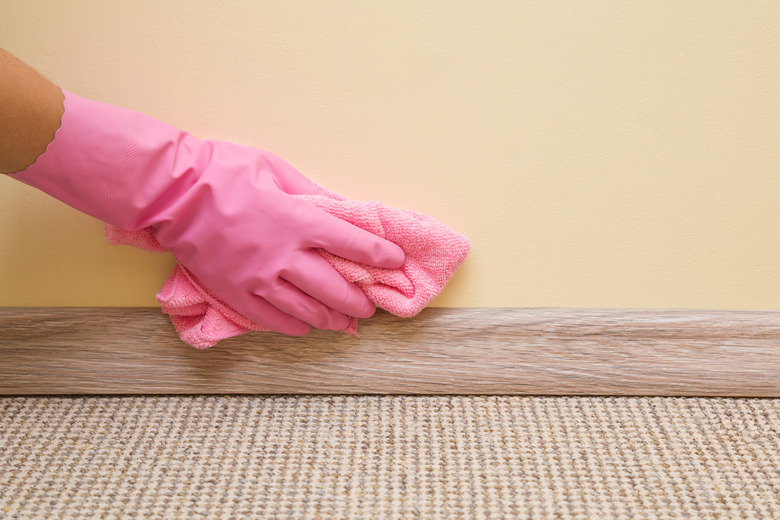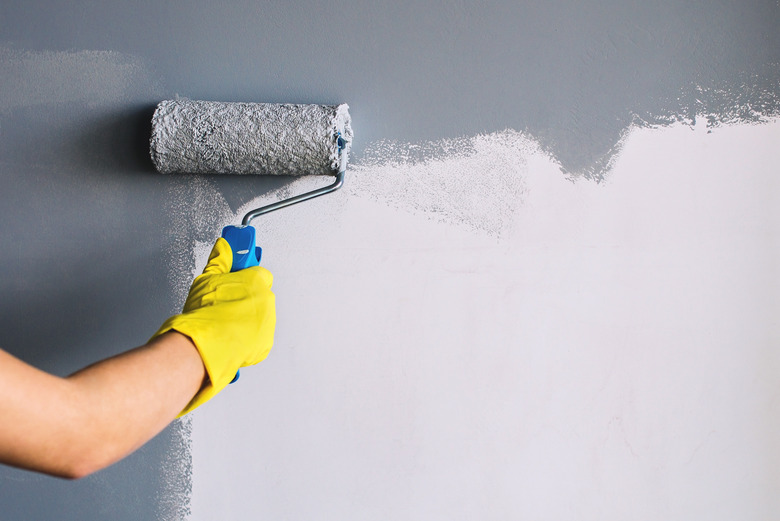How To Hire An Interior House Painter: 11 Questions To Ask
We may receive a commission on purchases made from links.
Hiring a pro for an interior paint job can save you time and stress — but only if you hire the right painting contractor. While anyone can offer painting services, not every painting company has the skills to do your home improvement job the right way. Most painting companies offer interior and exterior painting services, so focus on interior painting questions to find someone with plenty of experience with indoor spaces. Asking the right questions before hiring a painter can help you find trustworthy painting professionals that give you top-notch results.
1. How Will You Protect My Home?
1. How Will You Protect My Home?
An interior paint job can get messy with the potential for drips and spills. Asking about how they protect your home gives you an idea of how careful the house painters are. A good painter moves furniture out of the way and uses drop cloths to cover your floors and furniture. You also want painters who respect your home by not wearing dirty shoes inside or banging ladders around where they might hit something. Look for a house painting service that talks about being careful inside your home.
2. What Prep Work Do You Do?
2. What Prep Work Do You Do?
The prep work is one of the most important parts of an interior paint job, so you want a company that spends a lot of time on this step. Surface preparation is essential for a smooth finish. It involves scraping loose paint and smoothing surfaces. Washing the walls is also an important step before painting, as is addressing mold and mildew. If they're painting the baseboards, sanding is necessary to prep the boards for paint.
3. Do You Handle Lead Paint?
3. Do You Handle Lead Paint?
If you have a home built prior to 1978, lead paint could be an issue, and it could require extra steps beyond the standard painting prep work. Disturbing lead paint can be dangerous for kids and pets in the home if they ingest it since it's a toxic substance.
Find out if the company can handle lead paint if your home has it. If you have an older home but you're not sure if it has lead paint, the painting company might test for lead before starting. Ask the company how they'll handle the job if they find lead paint, which might include lead abatement or encapsulation. This will add to the timeline and cost, so discuss the details if this extra step is necessary.
4. Do You Complete Repairs?
4. Do You Complete Repairs?
If you know you have issues that need to be repaired, make sure the painter will handle them. They might need to make surface repairs, such as patching holes in drywall or smoothing out rough spots. Painters typically handle these routine repairs, but some might not. If they don't, you'll either need to DIY the repairs before the painters start or hire a handyman to fix things.
5. What Paint Products Do You Use?
5. What Paint Products Do You Use?
When you hire a painting company, they should help you with the paint selection, including the right colors and type of paint. The quality and type of paint the contractor uses affect how your interior paint job looks and how long it lasts. You might have the choice between different paint quality levels, which will affect not only the durability but also the pricing.
An interior painter should explain the differences and how the quality levels might affect the results. Inexpensive, low-end paints won't hold up as well as premium paints, and they're often thinner because they have fewer solids in them, so they require more coats. Premium paint usually contains more binder and pigment, which allows it to cover better for a smooth, even result with fewer coats. If you're covering a dark color with a lighter color, the quality of the paint can be even more important. It can be difficult to cover darker colors with inexpensive paint.
If you have particular products you want to use, ask the painter if they can accommodate that. They might explain that they only use certain brands, or they might explain why they don't recommend the type of paint you want for your project.
6. What Application Methods Do You Use?
6. What Application Methods Do You Use?
Professional painters might use brushes, rollers, or sprayers to apply paint. Ask what methods they use so you understand the process. Painters often use different application methods for different parts of the job. For example, they might use a sprayer on the ceiling and a brush on the trim. If they're using a sprayer for any part of the job, ask how they'll keep the paint from getting on floors, light fixtures, windows, and other features.
7. How Many Coats Are Needed?
7. How Many Coats Are Needed?
One coat of paint usually won't cut it if you want a professional finish. Ask the painter how many coats of paint they'll apply to gauge the quality of their services. The answer might vary based on the paint colors you choose, the existing wall colors, and the quality and type of paint you choose. For instance, higher-quality paints will cover in fewer coats. If you're going from a dark to a light color, you might need more coats regardless of the paint quality.
8. What Are the Typical Steps?
8. What Are the Typical Steps?
Ask the painter to walk you through the steps they do for a typical job. This usually involves surface prep, caulking, priming, painting, touch-ups, and cleaning. This helps you understand how the process will go, and it helps you spot a company that'll try to take shortcuts.
If their process seems to miss a step, ask them about it. For instance, priming is an important step for interior walls, so if they don't mention priming, ask them if they're going to do it. They might have forgotten to mention it, or it might be something they don't do.
9. What Is the Expected Timeline?
9. What Is the Expected Timeline?
Asking how long the project will take helps you prepare, but it can also help you determine if the painter knows what they're doing. A company that promises an unrealistically short finish time might cut corners and do sloppy work. Ask how long each stage of the painting process will take, including preparation, repairs, priming, painting, and cleanup. This can help you plan since you'll have an idea of what will happen each day. For instance, you might want to be out of the house when they sand and prep the walls if you're sensitive to dust.
The amount of time it should take varies depending on the paint job, but an average room could take two to four days for professional painters to complete, including all prep work and painting. If the room has lots of architectural details or lots of damage that needs to be repaired, the job will likely take more time than normal. The overall job will also take longer if you're having multiple rooms painted.
10. What Cleanup Do You Do?
10. What Cleanup Do You Do?
Don't just assume that the painters will clean up everything and put your house back to how it was. They'll remove their supplies, but the level of additional cleaning they'll do may vary. Reputable contractors often clean well and leave the house in the same condition they found it. Verify that the painters will clean up after themselves and put furniture back where it belongs if that's what you expect. It's best to get that in writing as part of the contract to make sure it happens.
11. Do You Offer a Warranty?
11. Do You Offer a Warranty?
When working with contractors, it's important to know what kind of guarantee you're getting for their work. Reputable contractors will guarantee their work in case the paint job fails. Warranties are usually limited to poor workmanship. Contractor warranties don't typically cover damage to the paint job, such as your child drawing on the freshly painted walls or gouges from something hitting a wall after the painters leave.
Find out if the company offers a warranty, what it covers, and how long the warranty lasts. Paint issues can sometimes take a year or two to show up, so longer warranties are better. Contractor warranties can vary significantly, often from two to eight years, and every warranty has exclusions, so read the fine print.
Best Practices for Hiring Painters
Best Practices for Hiring Painters
If you decide to hire a painter instead of doing a DIY paint job, it pays to take extra steps to vet the options.
- Get at least three bids. Checking with multiple contractors lets you compare the options and find the best match for your needs.
- Review the contract. Examine the contract details for red flags and ensure you agree with the terms. Check the payment terms, including how much they want upfront. You might have to pay a portion of the total cost before the contractor starts working, but move on to the next option if someone asks you to pay the full amount upfront.
- Ask about employees vs. subcontractors. Some companies use subcontractors instead of hiring employees. While many subcontractors do a good job, the people doing the work might change from one job to the next. Employees often have more incentive to perform well to keep their job.
- Research their experience. Find out how long each painter has been in business and what their qualifications are. Ask about their typical jobs to make sure they do a lot of interiors.
- Ask for references. Local painters should have references they can provide so that you can talk to several people about their experience. Another option is asking to see a portfolio of past work. This lets you see the workmanship of the company so you can know what to expect.
- Look at online reviews. Search online review sites to check ratings for painters you're considering. Look at both the numerical rating and the reviews left by previous customers. If you see recurring complaints, consider it a red flag that you need to investigate.
- Ask for proof of insurance. Find out if the company is licensed, insured, and bonded before hiring them. Not all states require licenses for painters. Painting contractors should be willing to give you a copy of their insurance certificate to verify their general liability and workers' compensation coverage.


